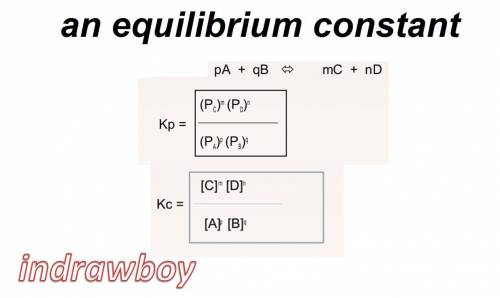
Chemistry, 04.08.2019 21:30 cutiecat66
Given the information for reaction 1 at a specific temperature; calculate kc for reaction 2 at the same temperature. reaction 1: 2ch4 (g) ⇄ c2h2 (g) + 3h2 (g) kc = 0.020 reaction 2: 2c2h2 (g) + 6h2 (g) ⇄ 4ch4 (g)

Answers: 1
Another question on Chemistry

Chemistry, 22.06.2019 03:50
Consider the reaction: n2(g) + o2(g) ? 2no(g) kc = 0.10 at 2000oc starting with initial concentrations of 0.040 mol/l of n2 and 0.040 mol/l of o2, calculate the equilibrium concentration of no in mol/l how would this be done?
Answers: 3

Chemistry, 22.06.2019 12:30
Nebulae are enormous clouds in outer space. they are made mostly of hydrogen gas, helium gas, and dust. some nebulae glow brightly, while others do not. the stars that people see are huge, bright balls of glowing gas. they are made mostly of hydrogen and helium. which statement correctly describes other ways in which nebulae and stars are different? a. stars can form inside a nebula but a nebula can never be produced by any star. b. a star always has a higher density than a nebula. c. stars can never form inside a nebula but a nebula can be produced by any star. d. a nebula always has a higher density than a star.
Answers: 3

Chemistry, 22.06.2019 13:00
6. using 3 – 4 sentences explain (in your own words) why water expands when it freezes? 7. using your knowledge of colligative properties explain whether sodium chloride or calcium chloride would be a more effective substance to melt the ice on a slick sidewalk. use 3 – 4 sentences in your explanation.
Answers: 1

Chemistry, 22.06.2019 14:00
How is the atomic number of a nucleus changed by alpha decay
Answers: 2
You know the right answer?
Given the information for reaction 1 at a specific temperature; calculate kc for reaction 2 at the...
Questions

Mathematics, 06.04.2020 20:38

Arts, 06.04.2020 20:38



Chemistry, 06.04.2020 20:38






History, 06.04.2020 20:39



Social Studies, 06.04.2020 20:39

Mathematics, 06.04.2020 20:39







![\large{\boxed {\bold {Kc ~ = ~ \frac {[C] ^ m [D] ^ n} {[A] ^ p [B] ^ q}}}}](/tpl/images/0170/8798/48dd8.png)

![\large{\boxed{\bold{Kc~=~\frac{[C_2H_2][H_2]^3}{[CH_4]^2} }}}](/tpl/images/0170/8798/ccc7e.png)
![\large{\boxed{\bold{Kc~=~\frac{[CH_4]^2}{[[C_2H_2][H_2]^3} }}}](/tpl/images/0170/8798/ae421.png)
![\large{\boxed{\bold{Kc~=~\frac{[CH_4]^4}{[[C_2H_2]^2[H_2]^6} }}}](/tpl/images/0170/8798/48299.png)




